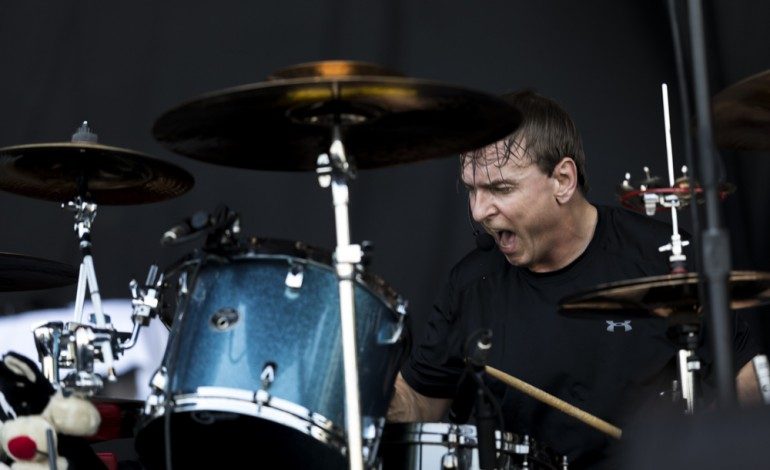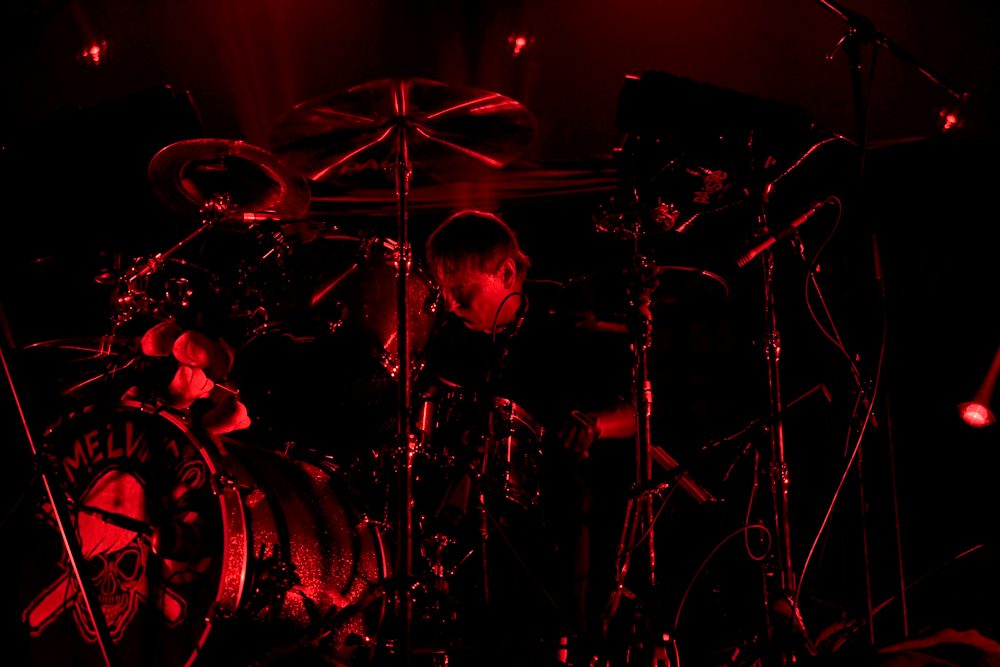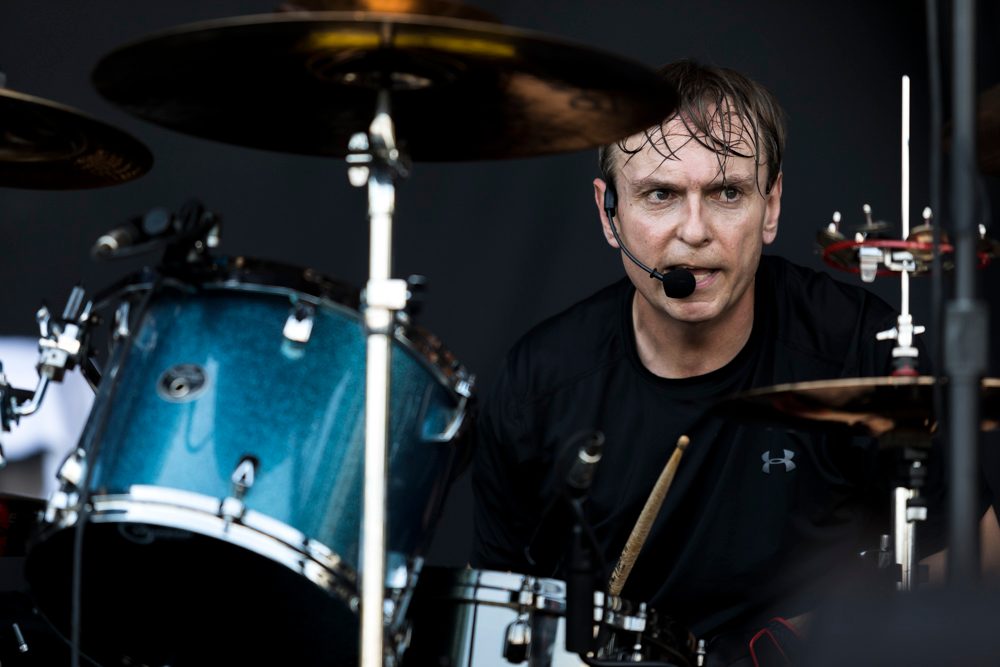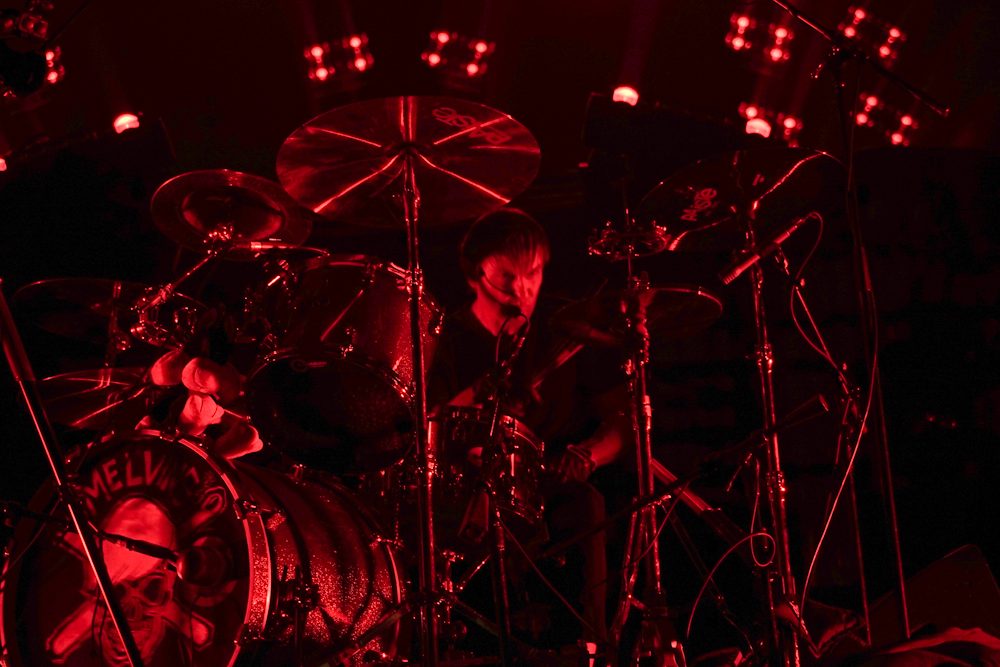

Musician Dale Crover has had an illustrious career as the drummer for the Melvins as well as supergroups such as Shrinebuilder and Crystal Fairy, and even briefly for Nirvana. In the new year, Crover welcomes two new projects, his third solo album Rat-a-Tat-Tat which is out this Friday and Melvins’ 24th studio album, Working with God which sees the band’s longtime drummer slide over to bass. mxdwn spoke with Crover about these upcoming projects, the details of creating his latest solo record and playing bass in Melvins’ 1983 lineup.
mxdwn: Was Rat-a-Tat-Tat completed during the pandemic?
Dale Crover: This year we did a bunch of touring with Redd Kross on the record that we put out last year, we were gonna tour Europe, and then we were gonna come back to the US and do the tour here, and my new solo record was gonna be out, it was supposed to come out in the summer, and then we were gonna tour in the fall. And then the pandemic, it ruined everything. I kind of had [Rat-a-Tat-Tat] done before, it was originally going to come out in the summertime, but I had been working on it for the last couple of years whenever I get spare time, which being in multiple bands is rare. Yeah, so it was pretty much done, it wasn’t mastered yet but we had been busy doing other stuff in the studio as well when this all happened. We all have to wear masks and wash our hands more often but right when this first happened we stayed away for a while and then gradually started working and doing something. So that’s what we did. Right when this started to happen, we were recording the Melvins 1983 record, and that’s me on bass, I get moved over to bass and then the original drummer plays drums and he was down here from Washington. He still lives in the town that the band started in: Montesano, Washington. So he came down here and that’s right when the outbreak was happening in Washington state, so there was some worry that he might not be able to get home, so we had him hurry up and get the drum track down and send him home. And we finished that after he had left. So that’s coming out in February, my new record comes out the month before, January, and then for New Year’s we’ve got this new thing called Melvins TV.
mxdwn: Yeah I was just looking at that, Melvins TV sounds exciting!
DC: Yeah I’ve seen some clips, it’s like crazy psychedelic. It doesn’t look like any of the other streams that I’ve seen before, so I think people will like it. It’s definitely different!


Photo Credit: Raymond Flotat
mxdwn: In keeping with upcoming Melvins projects for a second, you mentioned how in 2021 Melvins will be releasing a new album Working With God, what are the benefits of getting to play bass when working with the band’s 1983 lineup?
DC: Yeah, it’s kinda something extra we can do. We did it well over 10 years now but we just got back together with Mike, I know how it happened. A while ago there was a release of the original demos that Mike plays on, it was actually called Mangled Demos. And I told them, ‘You guys should play shows,’ and Buzz was like, ‘I’ll do it, but you have to play bass.’ I don’t think he had any interest in playing with Matt Lukin anymore but we’ve remained friends with Mike Dillard for all these years. So we got together and played shows and then decided, well, why don’t we just write new songs? So that happened and this is actually our second record of new songs from that lineup. More simple, I guess then some of the other Melvins stuff, more straight ahead. But to me, it still sounds like the band and I mean, I think if we didn’t tell anybody that it was the old lineup, that they probably really wouldn’t notice that much. I mean it’s still Buzz writing the songs more or less, but he writes more in a fashion that Mike can play. Once I go, the band starts to get rhythmically more complicated. He’s a great drummer but there’s more straight-ahead conduction. That sounds bad – we’re not dumbing it down for him. I really like these new songs a lot, I think they came out great. I listened to the record just recently and was like, ‘Wow it really came out good, I’m pretty happy with it!’
mxdwn: How does this latest project differ from other solo albums The Fickle Finger of Fate and Sell Out?
DC: Well, I did that record because at Joyful Noise they do these like crazy lathe-cut records and they’re super limited edition and they did this one called Skins. It’s really crazy, it’s got six holes in it. It doesn’t look like it’ll play, but it’s two-sided, and like wherever you put the record, you can put it off-center or whatever and it looks really weird on your turntable, it will play. But since it was a limited edition, a lot of people didn’t get it and they were mad, so I’m like, well what if I did the full-length solo record and mix those songs, these weird drum songs, with regular songs. So that album kind of compiled that way, but then this new one, I didn’t sit down and go, ‘I’m gonna write a whole record.’ The songs came when they did that. It was in my mind, though, that it probably was going to be on a full record. But then we also did a similar thing with another crazy disk that came out before this with more drum songs. Compared to the last one, I guess this one has more regular songs. And then there’s a few that I wrote on GarageBand, and that was kind of an experiment to see what it would be like.
mxdwn: What was that like, writing on GarageBand?
DC: It was kind of fun to figure the whole thing out and learn how to do it. Some of the tracks are actually built-in GarageBand tracks like the drums I think – I replaced them, though. I did the track from my phone and then transferred them in the studio, started replacing stuff but some of the stuff I kept. There are a few songs that are GarageBand tracks I kept the vocals on and I was going to redo them, but Toshi [Kasai] said, ‘They sound really good, why?’ When I try to write, I’ll have the melody first. So I’ll just sing, with no words, and make up stuff as I go along and then take it and make it into a song. And that’s what these were, more or less. So then there was this one song I wanted to review, and he’s like, ‘Well, it sounds like you’re drunk or something, you sound really weird, so I think it’s cool.’ So I was like, alright, we can leave it.


Photo Credit: Marv Watson
mxdwn: Is it a nice change of pace to focus on instruments other than drums with projects like Rat-a-Tat-Tat?
DC: Yeah, I’ve been playing guitar for a long time, actually longer drums. I think I ended up playing drums because I was playing guitar and had a friend of mine playing drums, and was like, wait, no play like this. I was showing him how to do it and it turned out that I knew how to play drums and then we were like, ‘Oh wait this is fun.’ I started doing more of this stuff though because the label really has been really encouraging and wants to put out records. So that definitely inspires me to do more. I think if I didn’t have that, I wouldn’t push myself to do it so much. It’s nice to have somebody to support you.
mxdwn: Speaking of your guitar playing, ‘Tougher’ is a really great guitar track, was it inspired by anything specific?
DC: I know, I’m playing crazy guitar on there! That song actually is the only one that’s co-written with somebody else, and that was with Toshi.
mxdwn: Yeah and you’ve been collaborating with Toshi Kasai for a long time now, right?
DC: Yeah, he’s been like the Melvins engineer for the last 20 years pretty much, ever since the Hostile Ambient Takeover record. He’s done pretty much everything since then, more or less. And then lots of other things too, like he did both the solo records. He and I do lots of outside projects too. Like if somebody wants drums on tracks, I’ve done some stuff like that. There’s a couple of guys in this band from Mexico that will fly in and we’ve done like three records with these guys now, a band called Low Flying Hawks. So we work together on stuff like that, we try to keep it busy. You’ve got to hustle in this business if you want to make any money.
mxdwn: Do solo projects like Rat-a-Tat-Tat offer you a different creative outlet than band releases?
DC: I guess so. I mean, compared to the Melvins it’s different because I play everything and I kind of have to approach it differently. I used to make my own songs on four tracks, on a cassette. And I would start with drums, which wasn’t the best idea because you have to memorize the song to make sure you are playing it right. Sometimes I’d have to change the song because I would have missed a part, I wouldn’t go back rerecord all of that stuff, I’d just change it. I figured out a better way to do it is to do guitar first so you have something to play along to. So I’ll go in and play guitar alone to like a click track normally and I didn’t really do that much with click tracks with Melvins. But you know once I have the guitar and the drums just take it away. It’s something fun to do. I really like recording and making songs. And when I go into the studio, I usually don’t really have everything finished, I’ve got rough ideas of stuff. So I’ll go in and lay it down, and then hear it and then change it if it needs to be changed or just build off of what I’ve got.


Photo Credit: Raymond Flotat
mxdwn: You recently performed for Joyful Noise Recordings’ Holiday Special live stream concert. Have you been enjoying live stream concerts as a temporary stand-in for live performances?
DC: I was a little bit reluctant when they asked at first. Like, ‘Oh no, I’ve got to do Christmas songs, okay.’ But then they were like, ‘Please please,’ and you know, I want to make those guys happy. We did it on video and we pretty much did it between me and Toshi and his partner who did the filming and editing. We came up with the whole idea and concept and all that stuff, we’ve got our own lights and did our own thing. And that was kind of fun. I kinda wondered, like man, 20-25 years ago people used to have so much money to make videos, huge budgets and we just did this one for nothing. People spent stupid amounts of money on stuff. I mean, of course, film was way more expensive and digital has definitely made things a lot easier. After doing that, we ended up buying green screens and basically almost making like a TV station studio out of our recording studio. And so that Joyful Noise thing was done there and that was kind of like this quick experiment with that. But yeah, the Melvins one is going to be totally nuts. It’s going to be like that times a hundred.
mxdwn: Do you have any plans for any stream performances of Rat-a-Tat-Tat after its release?
DC: I was hoping to, yeah! Hopefully we can do some kind of streaming thing. I’m hoping that I can at least record one song live for when the record comes out, you know, kind of as like promotion or whatever.
mxdwn: And you have the Melvins New Years Eve live stream show Melvins TV: Volume 1, New Year’s Evil. It sounds like there will be more of these shows to come, what do you think fans will be able to look forward to in these future live streams? How many do you plan to do?
DC: Yeah, it’s gonna be a series I guess. We plan on doing four for sure and if it goes well we’ll keep doing it. We’ve got to see what happens with it. Hopefully, people dig it and want to keep watching different episodes. Most people that are doing streaming concerts, you can do one, and then, when can you do another? You kinda can’t. We’re trying to make this into something that’s more interesting. You know, it’s only five songs, and then there are interviews with us as well. It’s us interviewing ourselves, so it’s pretty good and then there are opening bands too! It is fun to do and it’s something different.
Featured Image Photo Credit: Marv Watson
